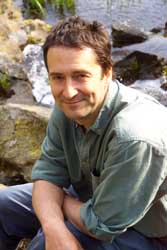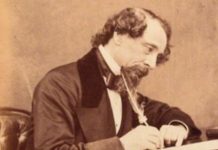 Jonathan Falla is an English writer long resident in Scotland, and treasurer of the Society of Authors in Scotland (SoAiS). The views that follow, however, represent his personal perspective on writing in Scotland and the Scottish nationalism/independence debate.
Jonathan Falla is an English writer long resident in Scotland, and treasurer of the Society of Authors in Scotland (SoAiS). The views that follow, however, represent his personal perspective on writing in Scotland and the Scottish nationalism/independence debate.
TeleRead: As a working writer, what do you see as the potential for making a living from writing in Scotland? Does this differ at all from the rest of the UK?
Jonathan Falla: The prospects for making a decent living from writing are poor and will continue to be. Most of us have to supplement it in other ways, such as teaching or editing. I see no reason to think that independence would improve matters. It is already difficult for writers in Scotland to get attention in the rest of Britain; with another barrier between us and London, how is that going to get any easier?
TeleRead: What is your evaluation of the programmes operated by the SoAiS and other institutions in Scotland to support writers and new writing?
Jonathan Falla: SoAiS has only modest outreach programmes, although we do set up events for members on subjects such as how to manage social media for publicity, and also debates. The main function of the SoA is information and support, especially legal/contractual support. We also do a certain amount of campaigning: SoAiS was one among many groups opposing library closures and cutting of librarianships in schools.
I’m reluctant to say much about other agencies as the situation changes frequently, and I don’t wish to criticise staff struggling to make the best of a poor hand. Creative Scotland do their best to squeeze what they can out of a drought-struck plant. But funding for anything is difficult, isn’t it? Last year, one Scottish council (Moray) cut its entire arts budget, 100%. As did Newcastle, of course.
Other people do their best, leaning increasingly on volunteers and goodwill. Would independence improve that situation? Why would it?
In recent years, life for Scottish publishers has become very difficult indeed, with the Arts Council/Creative Scotland withdrawing core funding and replacing it with project funding, i.e. book by book, which makes it impossible for publishers to plan ahead. The publishing of fiction has shrivelled. Several Scottish publishers (NWP, and Two Ravens for example) have stopped issuing new fiction altogether, because every book lost money. Others such as Polygon have cut their lists to the safest options, usually crime. Only one or two (such as the new-ish Freight) take more risks. Again, I can’t see how putting up another frontier and tightening the domestic market still further is going to help that. Nor can I see that as a writer I would have any more say in the matter than I do already. These decisions were made in Edinburgh.
TeleRead: Has the independence debate helped raise the profile of writers and writing in Scotland, as well as cultural matters in general?
Jonathan Falla: This is where I have very uneasy feelings. It is widely reported that most people in the arts are pro-independence. Certain vociferous speakers (like Alan Bissett) assert that this is because writers habitually take risks and imagine the new. True enough – but he forgets other functions of writers, such as to record experience, to anatomise discontent, and to imagine what might happen, good or ill.
My own experience includes some fifteen years of famine and health work in tropical countries and disasters. Again and again, I have witnessed conflicts fed by nationalism and chauvinism. I despise and fear both. Of course I don’t expect genocide in Fife, but I know of no reason why Scottish nationalism should prove any more immune than anyone else’s. As one of around half a million English in Scotland, I see nothing desirable about being obliged to be a citizen of a smaller country. I have friends on the island of Lewis in the Hebrides, and friends in the town of Lewes in Sussex; why would I want a frontier between them?
In the arts, chauvinism is all too easy. When I first moved to Scotland in the mid-eighties, anti-English sentiment was trivial but niggling, persistent and hardly questioned. I had begun to think such attitides were dying out, but I fear not. I’ve been told by an Edinburgh actress that as an Englishman I had no business making a criticism of Scottish thinking in a play; I’ve been upbraided by a book reviewer for recalling that during WW2 Polish exiles were beaten up in Glasgow; and I’ve attended the launch of a new version of the Bible in Scots at which it was announced that the various voices were written to represent every region of Scotland – except for the Devil, who was to have an English accent. That strikes me as an incitement to racial hatred. I’d love to be proved wrong, but I don’t see independence improving this situation.
Even in a kinder atmosphere, it seems to me that an independent Scotland that becomes focussed on searching out its artistic “identity” (as is often touted) runs the risk of becoming narrow minded, repetitive, and frankly dull. The rest of the world will look away and yawn. As Keats knew, the arts thrive on “negative capability” – on uncertainty, on lack of definition, on the inconclusive, and the unresolved.
































